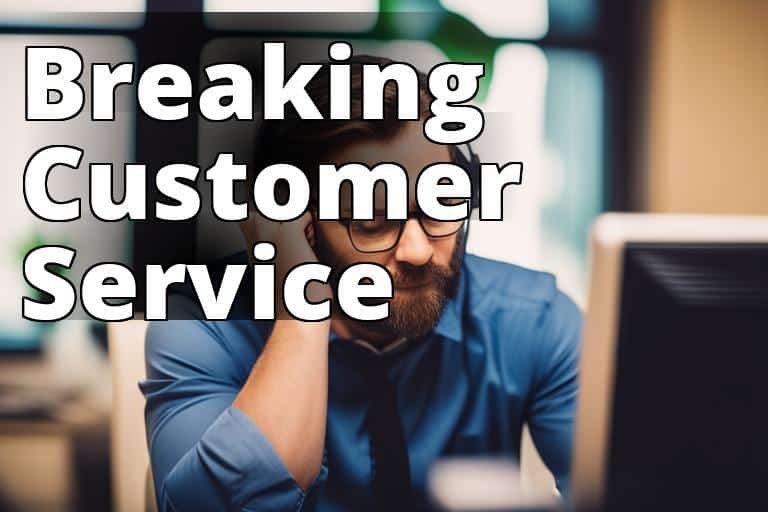Maximizing Success with Customer Relations Management CRM
Entering the world of customer relations management CRM can seem like a daunting task, especially when you’re new to its intricacies.
Navigating through various forums and LinkedIn posts, it’s easy to get overwhelmed by the complexities involved in managing customer relationships effectively.
“To manage a system effectively, you might focus on the interactions of the parts rather than their behavior taken separately.”
The truth is that understanding and implementing an efficient customer relations management CRM strategy doesn’t have to be as complex as it seems.
Table of Contents:
- The Power of CRM in Business
- Exploring the Functionality of Modern CRM Systems
- The Impact Of CRM On Customer Experience
- The Impact of CRM on Customer Experience
- Harnessing Data for Strategic Decision Making
- The Future Of CRM – Cloud And AI Integration
- The Future of CRM – Cloud and AI Integration
- Assessing Leading Contenders in the CRM Market
- FAQs in Relation to Customer Relations Management Crm
- Conclusion
The Power of CRM in Business
With the rise of CRM as the fastest-growing enterprise application software category, businesses across all sectors are recognizing its significance. By 2027, the CRM industry is expected to be worth an impressive USD $114.4 billion.
A key to business success is effective customer relationship management.
In an era where customers have countless options at their fingertips, maintaining robust relationships with them can make or break your company’s bottom line. This is where investing in comprehensive CRM systems becomes vital for any forward-thinking organization.
Leveraging CRM Software for Enhanced Customer Relations
Not only does a well-implemented CRM system help you keep track of individual customer preferences, but it also enables personalization like never before.
This level of customization leads to stronger bonds between companies and consumers, resulting in improved loyalty rates which ultimately translates into increased sales conversions.
Growth Prospects Offered By Advanced CRMs
Your growth strategy could greatly benefit from implementing modern-day CRM platforms.
Savvy businesses understand that these tools offer more than just streamlined sales processes; they provide valuable insights into consumer behavior patterns critical when making strategic decisions related to product development or marketing strategies.
Taking Customer Service To The Next Level With Effective Use Of CRMs
Beyond enhancing your team’s ability to close deals effectively, today’s advanced CRMs come equipped with features designed specifically towards improving overall customer service experiences too.
These sophisticated systems enable real-time tracking and handling support tickets, ensuring prompt resolution times, thereby significantly boosting client satisfaction levels and further strengthening brand loyalty among clients.
In our next section, we’ll explore how contemporary CMS platforms revolutionize operations, so stay tuned.
Exploring the Functionality of Modern CRM Systems
The revolution in business operations is largely credited to modern CRM platforms. By consolidating contact data from diverse channels, these systems offer a holistic view of customers.
A critical feature: lead tracking through the sales cycle.
As Benjamin Franklin put it, “By failing to prepare, you are preparing to fail.” This applies perfectly when discussing the importance of monitoring potential clients’ progress from initial interaction all the way up until the final sale using CRMs.
This level of preparation and understanding allows businesses not only to capture but also to nurture every opportunity that comes their way.
Understanding Artificial Intelligence in CRM
Using AI in CRMs has revolutionized the way businesses operate across industries. AI’s ability to analyze an enormous amount of data points offers predictive insights on customer behavior and purchase history.
Fine-tuning product offerings or guiding marketing strategies becomes significantly easier with such granular insight at your disposal.
Beyond just tracking leads and integrating AI capabilities, handling support tickets efficiently forms another key aspect where contemporary CRMs excel. Whether it’s resolving issues promptly or routing queries accurately, this goes a long way towards improving the overall client experience.
Furthermore, many organizations leverage automated marketing campaigns driven by their CRM software, which helps maximize engagement rates through personalized messages sent out at optimal times based on patterns identified within contact data.
Moving forward into an increasingly digital future where each interaction matters more than ever before, harnessing advanced features like those offered by a robust CRM platform will be crucial for any business aiming to stay competitive and relevant amidst evolving market dynamics.
The Impact Of CRM On Customer Experience
Modern CRM systems revolutionize business operations by consolidating customer data, tracking leads, and integrating AI for predictive insights. Efficient support ticket handling and automated marketing campaigns further enhance client experience. In a digital future, leveraging these advanced features is vital to stay competitive.
The Impact of CRM on Customer Experience
As businesses, we understand the value in nurturing customer relationships. That’s where a strong CRM solution comes into play – it offers personalized marketing that understands and caters to individual customer needs.
A well-implemented CRM is your key to meaningful engagements with customers.
“The aim of marketing is to know and understand the customer so well the product or service fits him and sells itself.” – Peter Drucker
In essence, this quote encapsulates what an effective CRM system does for you: It allows you to tailor interactions with customers based on their preferences, leading towards stronger business-clientele relations.
Enhancing Customer Service with CRM
Fusing a service-based approach within your company’s operations using CRMs helps manage inquiries across various channels like social media or online chat effectively. This comprehensive integration ensures prompt responses, enhancing overall client satisfaction levels significantly.
Your response time can make all the difference between keeping a loyal clientele base versus losing them over minor issues, hence necessitating swift action at every step along the way.
An added benefit lies in gaining valuable insights about common problems faced by clients, which can be utilized later for improving product offerings, thereby further streamlining operational processes as required over the time period under consideration.
Social Media: A Powerful Ally In Client Servicing
In today’s digital era, social media platforms have emerged as crucial touchpoints offering real-time interaction opportunities while managing arising concerns swiftly, thus leading towards improved consumer satisfaction rates through efficient use of integrated CRM systems available out there currently in the marketplace.
Harnessing Data for Strategic Decision Making
Utilizing cloud-based CRM systems to organize customer information and leverage it for strategic decision making is becoming an increasingly important part of the data-driven world. The power of accessible and easily available data can’t be underestimated when it comes to optimizing sales productivity and driving targeted marketing efforts.
The Role Of Data In Sales Forecasting
Data is the lifeblood of modern business, particularly in relation to CRM systems. These platforms gather an impressive array of data, including details about customer interactions, purchase history, preferences, and feedback – you name it. Having a comprehensive set of data enables companies to get an understanding of how customers act, which is essential for optimizing sales approaches.
Predictive analysis isn’t just fancy tech jargon – it’s your key tool for future-proof planning.
Beyond merely collecting past transaction or interaction data, today’s CRMs analyze these trends over time, resulting in accurate predictions known as ‘sales forecasting’. With this predictive capability at hand, companies can anticipate future demand accurately, enabling them to effectively plan resources.
Sales forecasts don’t exist purely within the realm of resource allocation either; they significantly influence overall business strategy too. For instance, by identifying products predicted to perform well based on historical trends and current market conditions, companies can prioritize those items in production line and promotional campaigns, thus boosting profitability.
The Future of CRM – Cloud and AI Integration
As the world becomes increasingly digital, businesses are turning to cloud CRMs integrated with artificial intelligence. This is especially true for small businesses who benefit from their scalability and affordability.
The Rise of Cloud-Based CRMs
In recent years, we’ve seen a significant increase in the adoption of cloud-based CRMs among small businesses. These cloud-based CRMs are appealing due to their cost-effectiveness and user friendliness.
A cloud CRM platform provides flexibility unmatched by traditional systems – you can access your customer data anywhere at any time. They’re also user-friendly with intuitive interfaces and robust support resources even if you don’t have extensive technical knowledge.
Beyond usability, these platforms operate on a subscription model which makes them more financially accessible than on-premise solutions requiring large upfront investments. As such, they present an affordable option for small business owners operating within tight budgets.
This financial accessibility extends further as these systems scale easily alongside your growing business needs – no risk of overspending or falling short when demand spikes unexpectedly.
Automated Sales Processes Through AI Integration
Moving beyond simple storage organization, modern CRM leverages capabilities offered by Artificial Intelligence (AI) to automate sales processes, increasing efficiency and profitability.
Artificial Intelligence (AI) has been revolutionizing various industries, including Customer Relationship Management. It analyzes vast amounts of data quickly, identifying patterns, trends, and anomalies faster than humanly possible, resulting in valuable insights into customer behavior, preferences, etc.
Such insights enable predictive modeling, leading not only to automated responses but proactive outreach based on anticipated needs, behaviors, and preferences. This significantly improves conversion rates, overall satisfaction levels, and boosts bottom-line results across all sectors, regardless of size, scope, operations. The integration between advanced technologies like AI is a powerful tool transforming how companies interact with customers, manage relationships, optimize marketing strategies, and drive revenue growth while reducing operational expenses through automation and improved efficiencies
Cloud-based CRM systems, combined with AI integration, are the future of customer relations management. They offer scalability, affordability and automation for small businesses, transforming sales processes and driving revenue growth while cutting operational costs.
Assessing Leading Contenders in the CRM Market
In a market teeming with customer relationship management solutions, it’s crucial to identify those that truly stand out. Here are some of the top players offering innovative and effective tools.
Salesforce: An All-Inclusive Approach
The trailblazer in cloud-based CRMs is Salesforce. Known for its extensive array of features including sales tracking, marketing automation, service ticket handling, and more, Salesforce caters effectively to businesses large or small.
An impressive aspect of this platform is Salesforce Einstein – an AI component capable of delivering predictive insights on consumer behavior, aiding data-driven decision making within organizations.
Zoho CRM: Balancing Cost And Capability
Zoho CRM offers essential functionalities like lead management and social media integration at competitive pricing tiers. This makes Zoho particularly attractive for smaller enterprises.
With a user-friendly design coupled with comprehensive customization options, Zoho has become a favorite among growing companies seeking efficient operational streamlining.
HUBSPOT: A USER-CENTRIC APPROACH
HUBSPOT’S FREE SOLUTION offers an intuitive interface that simplifies complex processes for beginners or those moving away from traditional methods of customer management.
A highlight is its ability to consolidate contact data across various channels into one centralized location, allowing teams easy access to critical information leading towards better decision-making processes.
Pipedrive: Tailored For Sales Teams
Pipedrive is designed specifically keeping sales teams in mind, focusing on visualizing the entire sales cycle and managing deals efficiently.
It provides users with tools that enable them to track leads through all stages, resulting in improved productivity and performance.
There are several other competitors, each bringing their unique set of offerings. It is essential for businesses to take into account their particular requirements, financial limitations, and long-term objectives when selecting a CRM system.
When selecting a CRM system, consider top contenders like Salesforce for its all-inclusive features, Zoho for cost-effective functionality, Hubspot’s user-centric approach and Pipedrive’s sales-focused design. Remember to align your choice with business needs, budget limitations and long-term objectives.
FAQs in Relation to Customer Relations Management Crm
What is customer relationship management CRM systems?
Customer Relationship Management (CRM) systems are tools that help businesses manage, analyze, and improve their interactions with customers. They streamline sales processes and enhance customer service.
What are the 3 types of CRM?
The three main types of CRM are Operational CRMs for managing daily operations, Analytical CRMs for data analysis to improve customer satisfaction, and Strategic CRMs for long-term relationship building with customers.
What are the 5 types of CRM?
Beyond operational, analytical, and strategic CRMs; collaborative and campaign management CRMs also exist. Collaborative ones share information across teams while campaign management ones handle marketing campaigns effectively.
What is CRM and how does it work?
A Customer Relationship Management (CRM) system consolidates all customer-related data in one place. It helps track leads through the sales cycle from initial contact to final sale, providing insights into consumer behavior along the way.
Conclusion
Customer relations management (CRM) is the cornerstone of modern business success.
The power it wields in consolidating customer data and tracking leads through sales cycles cannot be underestimated.
Its role in enhancing customer experience, by providing personalized marketing and seamless interactions, has revolutionized how businesses operate.
Data from these systems not only organizes but also informs strategic decision making – a game changer for optimizing sales productivity and driving targeted marketing efforts.
And with the future looking bright with cloud-based CRMs integrated with AI, small businesses are set to reap even more benefits such as automated processes leading to increased efficiency.
If you’ve found this insight into CRM enlightening and want to learn more about leveraging software for your business growth, I invite you to explore my blog Chrisvassiliou.com. Drawing on 35 years of customer service experience, I share innovative ways that can help get your business more leads. Let’s navigate this journey together!



